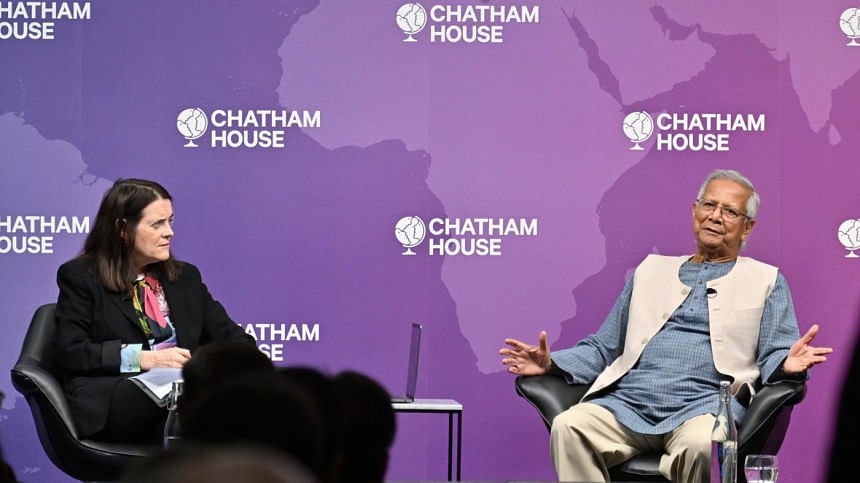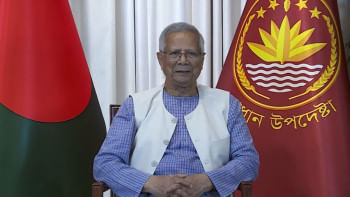Clarity from one London dialogue: Will the other follow suit?

Even if the much-anticipated meeting between Chief Adviser Prof Muhammad Yunus and Tarique Rahman, acting chairman of the BNP, the leading political party in Bangladesh, fails to fulfil the high expectations of bridging differences over the recently unveiled election roadmap, London has nonetheless emerged as the place where the interim government's strategy gained much-needed clarity. This was largely due to the Royal Institute of International Affairs, commonly known as Chatham House, hosting Prof Yunus for a discussion and Q&A session focused on Bangladesh's future trajectory. The conversation addressed both domestic issues, such as elections, democracy, and institutional reforms, and foreign policy concerns, particularly relations with India and the Rohingya refugee crisis.
This context underscores a glaring issue: the Chief Adviser's Office still lacks an effective communication strategy. Had similar interactive press sessions been held in Dhaka over the past 10 months, many unanswered questions might have been addressed. Of course, no one desires a return to the fawning praise and suppression of dissent that characterised Sheikh Hasina's rule over 15 and a half years. However, meaningful engagement with the press—beyond selective interviews or statements by a frequently seen spokesperson—is long overdue.
At Chatham House, while most questions came from the moderator and sympathetic expatriates, the chief adviser's responses were clear and direct. His categorical rejection of any future political role and dismissal of the idea of a referendum are especially significant. Critics and conspiracy theorists have long speculated that the delay in holding elections beyond December 2025 is driven by his personal political ambitions. A referendum, they argued, could be used as a means to extend his mandate under the guise of enacting reforms. His unequivocal stance helps dispel those suspicions.
Yunus reiterated that the interim government has three core mandates: a) reforming institutions that enabled the rise of authoritarianism; b) ensuring accountability for those involved in killing protesters and committing grave human rights violations; and c) holding a free and fair election. While these goals are widely supported, the question of a timeline remains contentious. The consultation process involving stakeholders and the complexities of judicial procedure make it nearly impossible to fix definitive deadlines for the first two objectives.
His declaration—"None of our cabinet members (of the interim government) would like to do that (stay in power)… Our job is to manage a smooth transition and ensure the people are happy when we hand over power to an elected government"—was reassuring. It addresses concerns raised by senior BNP figures who question the interim government's neutrality, particularly due to the continued presence of two former student leaders in ministerial positions.
Allegations have surfaced that these two figures are preparing to contest in the next general election and intend to join the newly formed National Citizen Party (NCP) once the election schedule is announced. Yunus's remarks suggest he has confronted them directly and secured assurances that they will not exploit their current roles for electoral gain.
Another pivotal issue raised was the future of Awami League following the ban on its activities. According to Yunus, the party, as it existed prior to August 5, has effectively sealed its fate as a criminal entity and cannot be considered a legitimate political organisation until it is held accountable for crimes against humanity. His observation that "none of that party has ever expressed remorse" leaves a narrow window for a reformed entity to seek national forgiveness—though such a transformation would demand genuine contrition and structural overhaul.
This puts pressure on international observers and allies of the Awami League, particularly India, who continue to call for the party's inclusion in future elections. They now face a stark choice: either persuade the Awami League to acknowledge and rectify its past, or accept the reality that the Bangladeshi public has decisively turned away from it. Even The New Indian Express, a publication close to India's ruling establishment, acknowledged in a June 2 editorial titled "Bangladesh history closes a dark loop with case on Hasina" that any push for inclusion without accountability is untenable, "If Hasina must be held to account, let the law take its course."
Meanwhile, Awami League's refusal to accept this new reality remains astonishing. Protests in London against Prof Yunus and the interim government—organised by some of the former Awami League ministers and MPs, who fled Bangladesh with dubious documents last year—only highlight their disdain for the law and public sentiment. Recorded interviews with the party's General Secretary Obaidul Quader and former minister Rezaul Karim openly acknowledging their illegal border crossings further expose their disregard for legal norms.
While it would be speculative to draw a direct connection between the Chatham House event and the Yunus-Rahman meeting, the former served as a timely opportunity to clear the air and possibly mend perceived rifts between the interim government and BNP. As BNP Secretary General Mirza Fakhrul Islam Alamgir hinted, this meeting could well mark a turning point in Bangladesh's political trajectory—if all goes as intended.
Kamal Ahmed is head of the Media Reform Commission in Bangladesh and an independent journalist. His X handle is @ahmedka1.
Views expressed in this article are the author's own.
Follow The Daily Star Opinion on Facebook for the latest opinions, commentaries and analyses by experts and professionals. To contribute your article or letter to The Daily Star Opinion, see our guidelines for submission.

 For all latest news, follow The Daily Star's Google News channel.
For all latest news, follow The Daily Star's Google News channel. 








Comments